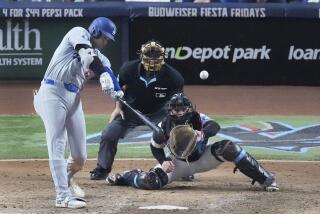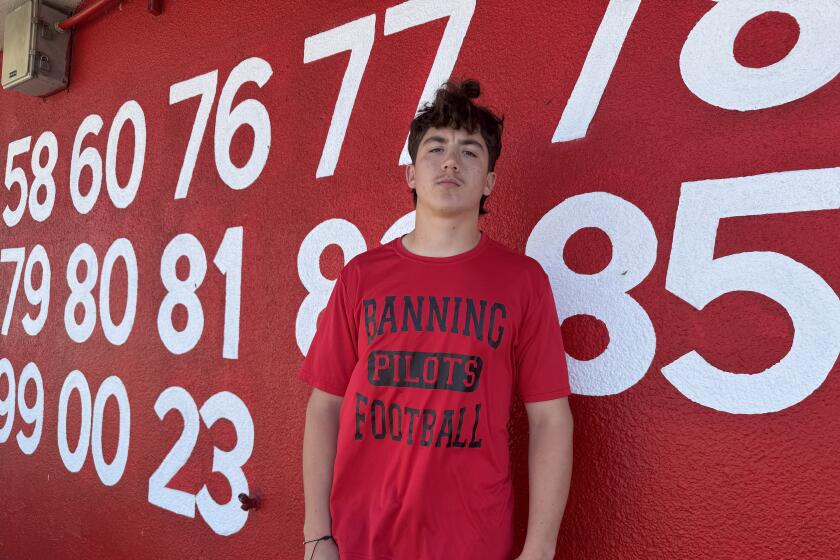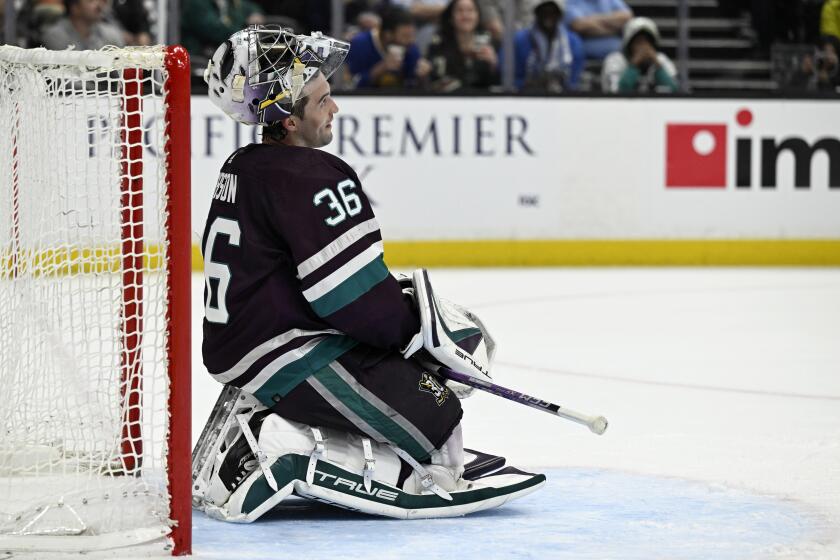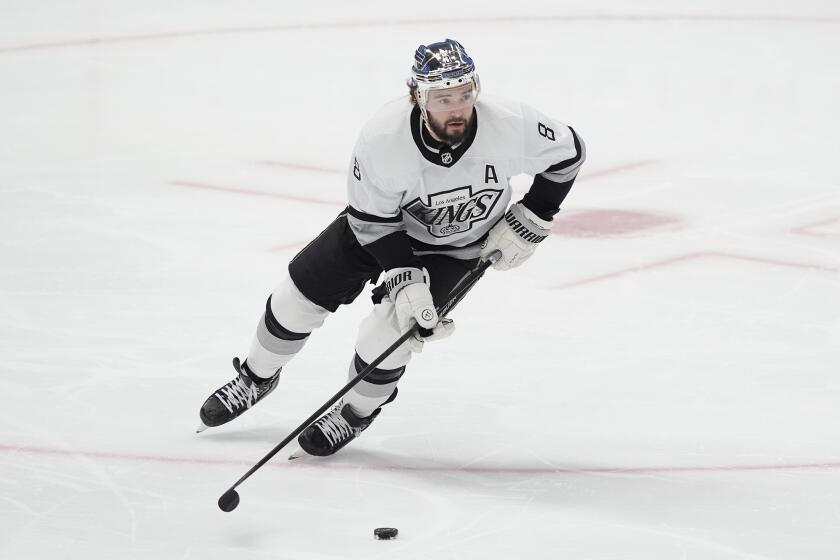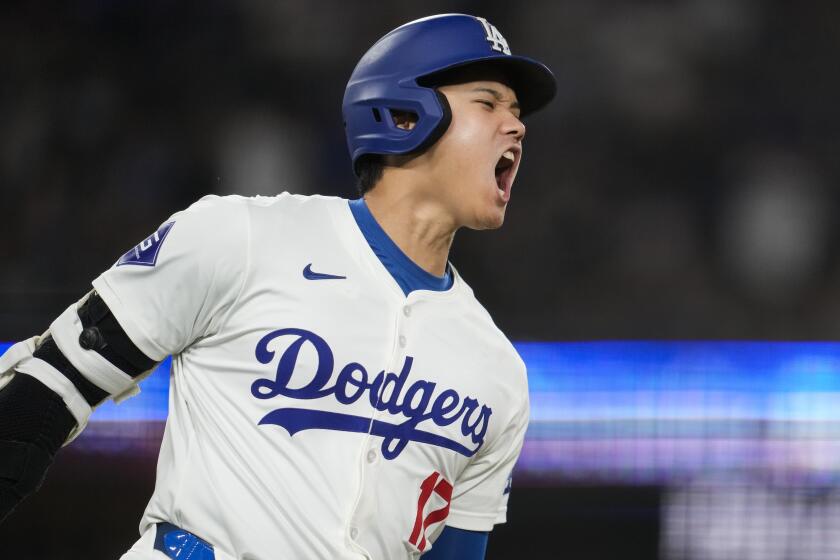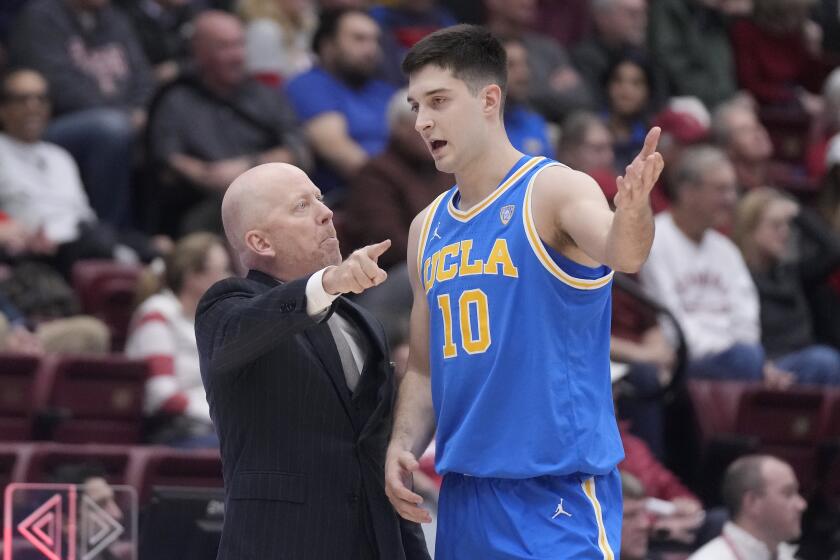NFL Could Have a Lively Ball of Its Own Unless It Strikes Out
Lift the lid on the National Football League’s 68th season, which five teams did last week with the opening of training camp, and you’ll see a kaleidoscope of colorful characters and some prickly possibilities.
This includes the most deflating possibility of all--a players’ strike.
Go ahead, take a peek. There’s Vinny, Bo and The Boz, a new network that joins the television crew (cable’s ESPN) and an estimated 200 players on summer camp rosters who, at one time or another, played in the USFL.
There’s more protection for quarterbacks, a one-year reprieve for the instant replay and the first testing of players for steroid use in league history.
There’s a new stadium and an underdog status for Don Shula of Miami, a coach known for making losing unbearable for his players.
The bottomed-out Raiders (8-8) have been slyly plucking every available gem in sight in the off-season, from St. Louis (cornerback Lionel Washington), from Green Bay (wide receiver James Lofton), from Canada (wide receiver Mervyn Fernandez) and even from major-league baseball (running back Bo Jackson). Now if the Raiders only had a quarterback.
There’s the reassurance in Dallas that Coach Tom Landry, who is a fit 62 going on 40, has been contracted to stay around for three more years. Landry will try to keep the dried-up Cowboys (7-9) from going the way of the oil business or, worse still, the way of the Houston Oilers.
There’s a resolute hope in Chicago that the body of Jim McMahon, Honda’s favorite punky quarterback, will hold up for an entire season, just this once. In Seattle, the Seahawks’ Steve Largent, a veritable Fred Astaire with pads and cleats, prepares to break Charlie Joiner’s NFL pass-catching record.
Meanwhile, they’re willing to bet you 50 pounds of biscuits in the Dawg Pound in Cleveland that Bernie Kosar is better than Boomer Esiason and that the Browns will make up the 98 yards (which Denver’s John Elway traversed in a blink) that separated them from Super Bowl XXI.
On a different level, Frank Gansz (Kansas City Chiefs), Marion Campbell (Atlanta Falcons) and Ray Perkins (Tampa Bay Buccaneers) try to prove that a new head coach can mean a new direction for teams that have a propensity for finding dead ends.
And as always, there is another defending league champion that heartily insists its ego doesn’t resemble the name stamped on its helmet: the New York Giants. The media Monsters of the Meadowlands will come to camp under a microscope replete with six new books hot off the presses and a wide receiver, former Navy man and Super Bowl hero Phil McConkey, who has hustled around the rubber-chicken circuit during the off-season plugging positive thinking, Jack Kemp, MIAs and, quite naturally, himself.
“I can tell you this. I know all of the guys on this team who wrote a book, and all of them took part in our off-season weight program,” said Giants’ safety Kenny Hill. He said the Giants won’t get fat and sassy, as some insisted the defending-champion Chicago Bears did last season.
Hill said, “The Bears won 14 of 17 games last year, a record that would have been acceptable to any other team in the league. If we go 14-2 with the opportunity to play for the championship, we’ll be quite happy. So much is being written about how difficult it is to repeat, more people should look at how difficult it is to win once.”
So, on the surface, everything seems smooth for the NFL. The league almost seems like the proverbial Man Who Has Everything.
Everything, that is, except perhaps a season.
Is there ever an NFL season in this era when some danger doesn’t loom on the horizon? If not in the courtroom, in the board room; if not in the board room, in the bargaining room.
The most immediate danger to the NFL is that few draft picks have signed and the probability for numerous training camp holdouts looms. As of Friday, only about 50 of 333 draftees were signed, including just three No. 1 picks and eight players who were drafted in the first five rounds. This signing pace puts the league markedly behind last year’s snail’s pace.
The crux of the problem is this: Management is making a concerted effort to roll back rookie salaries, and the players union and player agents have united to turn down any offers below the rookie standards set last year. Similarly, there are an unprecedented number of unsigned veteran free agents around the league, including 14 Redskins (Jay Schroeder, Joe Jacoby, Dave Butz, Rich Milot, Mel Kaufman and others).
General Manager Jim Finks, whose New Orleans Saints are among the 10 teams that hadn’t signed any draft picks as of Friday, said, “There are so many players and agents who are stonewalling our offers. They are taking the position that the clubs are trying to roll back prices, and that’s exactly right.”
The long-term danger facing the NFL is that the five-year collective bargaining agreement expires Aug. 31 and, as always, there exists the possibility of a players’ strike.
The players are seeking a three-year agreement (to match the length of the league’s $1.42 billion television deal) with a variety of advancements, including a free-agent system without the strings of compensation and right of first refusal attached.
Owners have argued that such a system isn’t necessary because, since 1981, player salaries have more than doubled to an annual average of $230,000 and that such an increase is more important than player movement.
Jack Donlan, executive director of the owners’ Management Council, and players union chief Gene Upshaw have held several negotiating sessions this summer.
The progress on the most integral issues has been negligible, however. One bargaining official noted that the primary function of the bargaining sessions held thus far has been to show both owners and players that the animosity between the sides from 1982 has disappeared and that a new conciliatory era has begun.
“You won’t see any real serious bargaining until Aug. 20, at the earliest,” one bargaining insider predicted.
“I know the owners will try to test us. They’ll wait to see if the players are united in training camp, and they’ll see that they are,” Upshaw said. “We’re far apart (from management) on the (free-agent) system and on pension. We haven’t even gotten to the nuts and bolts. Until the pressure (of a deadline) is on, that’s when you’ll get something going.”
But Donlan said of the contract expiration date, “What’s the magic of Aug. 31 other than that it’s the amendable date? They have given us a 123-page proposal, with hundreds of issues that don’t appear in their ‘Game Plan’ booklet (distributed to players several months ago), and we’ve got a few issues of our own. Do they honestly believe that we’ll look at 123 pages and--let’s just say the contract passes the (Aug. 31) amendable date--that we’re prepared to turn into a frog or a prince?”
Since 1968, NFL players have struck each time in which the collective bargaining agreement had expired and needed to be replaced (1968, 1970, 1974, 1982). Only in 1982, however, was the regular season interrupted. Because both sides have so much to lose by a strike, some insiders believe it’s possible that if history is repeated, it will be 1974 (when players agreed to continue to play under terms of the existing contract while a new one was negotiated) and not 1982 (when a work stoppage by players wiped out seven weeks’ worth of games).
Commissioner Pete Rozelle has said the 1982 strike, which came on the heels of a season that had produced the highest attendance and television ratings in league history, took several years for the NFL to overcome. In an interview last week, Rozelle said, “The owners and players both have a lot to lose” in a strike.
Rozelle pledged to “work behind the scenes and stay as close as I can to Jack (Donlan) and Gene (Upshaw).” He said he walks a fine line as commissioner at such times, noting, “The last time I offered to get involved, Ed Garvey said that my only involvement would be as a representative of management. Of course, Gene has a somewhat broader view.”
The league has indicated that it will include mandatory steroid testing for players this summer, despite the fact that the players union has voiced objections.
Doug Allen, the union’s assistant executive director, said the objections are based, in part, on the union’s interpretation that steroid testing is not currently allowed in the collective bargaining agreement and also because of fears that, as a result of the test, management will either discipline a player or breach his confidentiality. In either case, Allen said, the players union would file a grievance against the league.
“The proper place to resolve this is at the bargaining table,” Allen said.
At their annual meeting on Maui last March, club owners voted to make several rules changes for the upcoming season: prohibiting chop blocking by offensive players; modifying the legal clipping zone and blocking techniques for offensive linemen; forbidding offensive players to block below the waist after a change of possession, and disallowing defensive players from taking more than one step and hitting the quarterback after he has released the ball.
Of the alterations, the last is the most noteworthy. Quarterbacks were injured with alarming regularity in the NFL last season.
A controversy was fueled over how to best protect these most recognizable players in the sport. The eventual rule change was a victory for anti-violence: Officials now can tack on 15 yards to the end of a completion or, in the case of an incompletion, mark off 15 yards from the line of scrimmage.
Hailed by quarterbacks, the rule has been loudly decried by defensive players. The Giants’ Hill, a member of the league’s most effective, punishing defense in 1986, said he doesn’t believe there will be fewer borderline late hits on quarterbacks in 1987, but rather, “I think there will be a lot more 15-yard penalties. You’re asking defensive players to do something that borders on the impossible. You’re asking them to stop their forward progress on a dime.”
More to Read
Go beyond the scoreboard
Get the latest on L.A.'s teams in the daily Sports Report newsletter.
You may occasionally receive promotional content from the Los Angeles Times.

